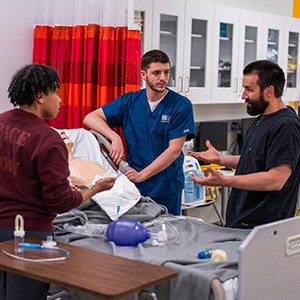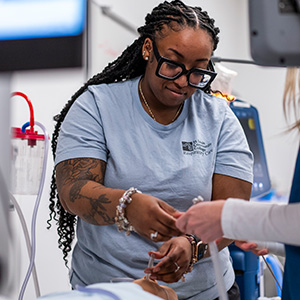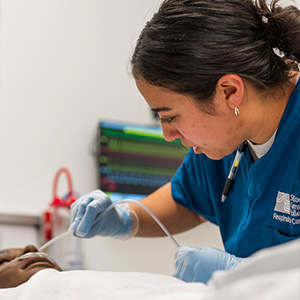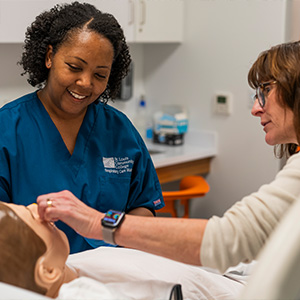Prepare for Advanced Roles with a Bachelor Degree in Respiratory Therapy
The respiratory care bachelor of science (BS) degree program prepares you for a career as a respiratory care practitioner. You will learn to assess, perform diagnostic tests, treat, and educate patients with cardiopulmonary disease.
As a bachelor of science degree, this program also includes curricular content in management, education, research, and advanced clinical practice, in order to ensure that you develop into a future respiratory care leader.
With the total cost of tuition being less than $15,000 for the entire program (not considering the help of financial aid), you will achieve a formidable return on investment.
When you graduate from the program, you will be eligible to sit for the NBRC board exams to obtain the Registered Respiratory Therapy (RRT) Credential.
This program has special admission requirements. Please review the requirements checklist before submitting your application.
What is Respiratory Care At St. Louis Community College?
Respiratory care is a specialized health care field where practitioners are trained in pulmonary medicine in order to work therapeutically with people suffering from pulmonary disease.
Respiratory therapists evaluate, treat and care for patients of all ages with cardiopulmonary disorders.
A day in the life of a respiratory therapist might include:
- Assessing patients for lung and breathing disorders and recommending treatment methods.
- Interviewing patients and performing physical examinations to determine what kind of therapy is best for the patient's condition.
- Consulting with physicians to recommend a change in therapy, based on your evaluation of the patient.
- Managing ventilators and artificial airway devices for patients who cannot breathe normally on their own.
- Responding to Code Blue or other urgent calls for care.
- Educating patients and families about lung disease so that they can maximize their recovery.
For more information about the respiratory care profession, visit the Be An RT website and the More RTs website.

What Can You Do With a Respiratory Care Bachelor’s Degree?
When you graduate from the BS in respiratory care degree program, you will be eligible to sit for the National Board for Respiratory Care (NBRC) exams to obtain the Registered Respiratory Therapy (RRT) Credential.
You can enhance your employment prospects and demonstrate speciality by sitting for exams for other credentials that you will be eligible to earn from the NBRC. These exams include:
- Adult Critical Care Specialist (ACCS)
- Neonatal/Pediatric Specialist (NPS)
- Registered Pulmonary Function Technologist (RPFT)
- Sleep Disorders Specialist (SDS)
- Asthma Educator Specialist (AE-C)
You can learn more about these credentials on the Examinations page of the NBRC website.
With these credentials and the training in management, education, research, and advanced clinical practice that you will receive in this program, you will graduate as a professional who is qualified for positions in leadership, research, education, and industry.
BS in Respiratory Care
- Degree Offered: Bachelor of Science
- Locations: Forest Park, Online
- Hours to Complete: 120
- Program Contact Name: Lindsay Fox
- Program Contact Email: STLCC-RespiratoryCare@stlcc.edu
- Accreditation
The bachelor of science in respiratory care program, CoARC program #210050 at Forest Park holds Provisional Accreditation from the Commission on Accreditation for Respiratory Care. This status signifies that a program with an Approval of Intent has demonstrated sufficient compliance with the Standards (through submission of an acceptable Provisional Accreditation Self Study Report (PSSR) and any other documentation required by the CoARC, as well as satisfactory completion of an initial on-site visit) to be allowed to admit students. It is recognized as an accredited program by the National Board for Respiratory Care (NBRC), which provides enrolled students who complete the program with eligibility for the Respiratory Care Credentialing Examination(s). The program will remain on Provisional Accreditation until it achieves Continuing Accreditation. - This program meets the educational requirements for state licensure in the following states: Missouri and Illinois. Students interested in pursuing licensure in a different state should contact the program coordinator for more information.
- Additional Resources:
American Association for Respiratory Care – professional organization
National Board for Respiratory Care Accreditation – credentialing
Student Handbook with Technical Standards
Tuition for district residents is $122 per credit hour for in-district students. Find out more about our straightforward and low-cost tuition structure.
In addition to your tuition and fees, you can expect to spend the following amounts on the listed items.
Item |
Cost |
| Textbooks (professional portion of program only) | Around $1,500 |
| Supplies (lab coat, scrubs, stethoscope, second-hand watch, personal protective equipment, etc.) | $300 - $350 |
| Criminal background check (price increases with additional residences) | $13.80 |
| Drug testing | $28.80 |
| Compliance tracking through CastleBranch | $27.50 |
| Physical examination and immunizations | Varies |
| American Heart Association’s Basic Life Support course at STLCC | $109 |
| American Heart Association ACLS course | $300 - $350 |
| Trajecsys Clinical Tracking System | $150 |
| AARC Early Professional Membership | $25/year |
Admissions Process
Applying to the BS in Respiratory Care Program
STLCC's bachelor of science in respiratory care program is a selective-admission, college-level program.
Each year, 16 students who meet the application requirements are accepted into the professional portion (Year 3 and 4) of the program on a first come, first-served basis.
Students cannot apply until a minimum of 45 credit hours of the AA General Transfer Studies - Health Science Pathway has been completed with "C" or higher grades in each course. A cumulative GPA of 2.5 or higher of this coursework must be met to apply.
Academic Advising
Prior to application, students are encouraged to meet with an academic advisor to help plan courses and clarify program requirements.
We recommend that you review the Bachelor of Science in Respiratory Care (BSRC) Admissions Requirements Checklist.
Admission Process
Once a student has completed a minimum of 45 credit hours of the AA - Health Science Pathway with "C" or higher grades and a minimum GPA of 2.5, the student must meet with an academic advisor to complete an application. Applications are submitted to the Program Coordinator Lindsay Fox at STLCC-RespiratoryCare@stlcc.edu and are accepted on a continuing basis. Students will be notified via their STLCC email on the status of their application.
Once the application is accepted, students will be notified of their placement on the admissions list via their STLCC email account. Students must complete the following to change their major to the BS in respiratory care degree:
- Completion of the remainder of hours needed to obtain the AA General Transfer Studies – Health Sciences Pathway.
- All required coursework must be completed with "C" or higher grades.
- The cumulative GPA of the AA General Transfer Studies – Health Sciences Pathway must be a 2.5 or higher.
- Attend a mandatory orientation in June.
- Complete a criminal background check and drug screen.
Additional requirements for clinical courses (RC300, RC340, RC380, RC400, and RC450) include immunizations, TB testing and AHA Basic Life Support certification. Detailed information on these requirements can be found in the Respiratory Care Student Handbook.
Program Goal
This program prepares graduates with demonstrated competence in the cognitive (knowledge), psychomotor (skills) and affective (behavior) learning domains of respiratory care practice as performed by registered respiratory therapists (RRTs).
As a bachelor of science in respiratory care degree, this program additionally prepares leaders for the field of respiratory care by including curricular content with objective related to the acquisition of skills in one or more of the following: management, education, research, and advanced clinical practice (which may include an area of clinical specialization).
Program Outcomes
The Commission on Accreditation for Respiratory Care (CoARC) accredits respiratory therapy education programs in the United States. To achieve this end, it utilizes an 'outcomes-based' process. Programmatic outcomes are performance indicators that reflect the extent to which the educational goals of the program are achieved and by which program effectiveness is documented.
Learn about the information on outcomes of all accredited programs.
Why You Should Choose STLCC's Respiratory Care Bachelor Program

Expert Instruction From Experienced Faculty
Our faculty are experienced respiratory therapists who are passionate about teaching and helping students succeed.

The Latest Technology Builds Your Expertise
Our facilities provide realistic clinical experiences with technology you’ll encounter in real-world treatment situations.

Affordable Excellence
STLCC's respiratory care program is one of the most affordable in the region and offers a variety of scholarships.

Advanced Clinical Practice
Experience specialized clinical rotations in local hospitals, allowing you to explore various work settings and potential respiratory therapy career paths.
STLCC. What's your reason?